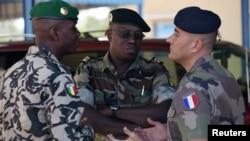The African Union is working with international partners and the Economic Community of West African States (ECOWAS) to deal with the fighting underway in Mali, according to the deputy chairman of the African Union Commission.
Deputy chairman Erastus Mwencha says the African Union always seeks a peaceful solution to situations like the one in Mali, where Islamist militants have seized northern regions of the country.
“We need to send a strong signal to the separatists and the people who are there that their action cannot be tolerated,” said Mwencha.
“Our expectation is to restore peace and to make sure Mali remains as an integral state, or Mali is in charge of its own affairs,” he added.
Mwencha’s comment comes as West African regional leaders plan to meet Saturday to approve a military plan to deal with Mali’s Islamist insurgents.
Mwencha says the African-led force will combat the Islamist separatist with the aim of maintaining Mali’s territorial integrity.
Some analysts have accused both the AU and ECOWAS of failing to act ahead of time in Mali, which they contend allowed the militants to take more territory in the north and threaten the capital, Bamako.
They also said the two organizations appear to have taken aggressive action only after France launched its own military offensive against the insurgents. Mwencha disagreed.
“It is not fair to say that there was a delay, because we have been engaging first of all to reach out and give negotiations, [and] call the parties to the table,” said Mwencha.
He rejected assertions that both the AU and ECOWAS should have taken military action earlier to crush the insurgency in Mali when it began.
Mwencha says the organizations believe that military action should be the last resort to end the crisis.
“Those who are criticizing always think that the best way to solve the problem is to send bombers and go and kill people. Then you are not better than the people you are fighting, because if they are terrorist killing people and you also start killing people, [then] what is the difference?” asked Mwencha.
“We have been in touch, we are talking and if that doesn’t work, then of course you go to war because all those avenues have failed,” he concluded.
Deputy chairman Erastus Mwencha says the African Union always seeks a peaceful solution to situations like the one in Mali, where Islamist militants have seized northern regions of the country.
“We need to send a strong signal to the separatists and the people who are there that their action cannot be tolerated,” said Mwencha.
“Our expectation is to restore peace and to make sure Mali remains as an integral state, or Mali is in charge of its own affairs,” he added.
Mwencha’s comment comes as West African regional leaders plan to meet Saturday to approve a military plan to deal with Mali’s Islamist insurgents.
Mwencha says the African-led force will combat the Islamist separatist with the aim of maintaining Mali’s territorial integrity.
Some analysts have accused both the AU and ECOWAS of failing to act ahead of time in Mali, which they contend allowed the militants to take more territory in the north and threaten the capital, Bamako.
They also said the two organizations appear to have taken aggressive action only after France launched its own military offensive against the insurgents. Mwencha disagreed.
“It is not fair to say that there was a delay, because we have been engaging first of all to reach out and give negotiations, [and] call the parties to the table,” said Mwencha.
He rejected assertions that both the AU and ECOWAS should have taken military action earlier to crush the insurgency in Mali when it began.
Mwencha says the organizations believe that military action should be the last resort to end the crisis.
“Those who are criticizing always think that the best way to solve the problem is to send bombers and go and kill people. Then you are not better than the people you are fighting, because if they are terrorist killing people and you also start killing people, [then] what is the difference?” asked Mwencha.
“We have been in touch, we are talking and if that doesn’t work, then of course you go to war because all those avenues have failed,” he concluded.
